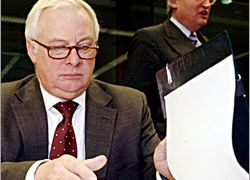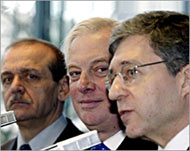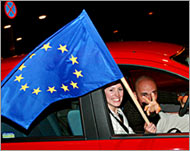EU: ‘Strategic partnership’
What is Europe’s role in the Middle East today?

Where does it stand on the issue of reform? Does the European Union find it imperative to solve the Arab-Israeli conflict and the Iraq quandary prior to any true stabilisation in the region? And how does the EU perceive the US-envisaged Greater Middle East Initiative?
Aljazeera.net put these and other questions to Chris Patten, the EU commissioner for external relations.
Chris Patten is a former member of the UK parliament and served as both education and environment secretaries under Prime Minister John Major’s government.
From 1992 to 1997 he served as the last British governor of Hong Kong before its handover to China.
Now he heads the department of external relations in the EU, an executive power dealing with relations between the EU and other world bodies.
The EU was set up by the Maastricht treaty in 1992 and represents a framework of economic and political co-operation among 25 European countries.
Its objectives are to promote economic and social progress and to represent the EU’s interests on the international stage.
Aljazeera: What is Europe’s role in the Middle East today?
Patten: The European Union has a longstanding commitment to the Middle East, as a friend, as a neighbour and as an important political and economic partner.
You can’t measure this relationship purely in financial terms, but the figures are telling: the EU spends almost €1 billion ($1.2 billion) a year in aid to the Mediterranean region alone, plus €2 billion in loans from the European Investment Bank.
|
“The European Union |
We are the major trading partner, and the major investor in the Gulf region and in the Mediterranean.
The EU wants to see a just and lasting peace in the Middle East and, as one of the four partners of the international quartet, we are working for a two-state solution, negotiated between the parties, which would result in a viable, contiguous, sovereign and independent Palestinian state existing side by side in peace with Israel.
Aljazeera: What effect has the Euro-Mediterranean Partnership had on Middle East countries?
Patten: The Euro-Mediterranean Partnership brings together 35 countries in Europe and around the Mediterranean, including Israel.
Despite the obvious difficulties, the partnership has made it possible to hold a truly regional dialogue, and this is important in itself. Euro-med is also a framework for decision and action.
We have concluded 11 association agreements and we are gradually creating a region-wide free trade area.
We co-operate on issues ranging from political and security questions, to customs co-operation and economic reform, to culture and education.
|
“All this creates opportunities for the countries involved from the Middle East |
All this creates opportunities for the countries involved and for their neighbours in the Middle East and the Gulf.
I am proud to have launched a project that I hope will bring a further deepening of our relationship with the Mediterranean region: The European Neighbourhood Policy.
This offers a closer relationship with the EU to those Mediterranean countries willing to work with us on our main issues of concern – the rule of law, democracy and human rights, economic development, and the security threats posed by regional conflicts, terrorism, organised crime and illegal migration.
Those who wish to work with us on these challenges will reap the benefits of greater access to the European single market, and to our programmes.
Aljazeera: How has the war on Iraq and the present Palestinian uprising affected the issue of reforms in the Arab world? Are they of any relevance?
Patten: Reform is important for all of us, including Europe. Promoting reforms has been at the centre of the Euro-Mediterranean Partnership for nearly a decade.
In order to be successful, reform must come from within, and cannot be imposed from the outside.
The Strategic Partnership for the Mediterranean and the Middle East, which the EU is currently working on, makes it clear that we want to draw on ideas from the region itself, consulting with governmental and non-governmental players.
 |
|
Patten with Palestinain and Israeli |
Reform in the Middle East does not depend exclusively on progress in the peace process between Israel and Palestine, but it is hard to imagine the region reaching its full potential without a settlement.
Lack of progress can only make it more difficult for reformers in the region.
I hope one day that Iraq will be stable and governed by a democratic government elected by Iraqis. A successful transition in Iraq can only help those seeking reform elsewhere in the region.
In the meantime, no one should see continuing violence in these two areas as an alibi to postpone reform.
The United Nations Development Programme (UNDP)’s Arab human development report has made clear just how important it is to the region to make progress in spreading the benefits of education, democracy, and women’s rights.
Aljazeera: The EU is going through a process of reform and integration. Does the lack of a clear political coherency and complex bureaucracy affect the role it plays or can play?
Patten: On 1 May the EU grew from 15 to 25 member states, and now has a population of 450 million people. Together we will represent almost a quarter of world trade, and more than half of the world’s external and development assistance.
We will be able to draw on the resources of 25 capable national administrations and, where we agree, bring our collective weight to bear in multilateral forums from the World Trade Organisation through to the UN.
 |
|
The EU recently welcomed 10 |
To meet the challenge of enlargement, our procedures are under review, and it is true that the EU is still developing its instruments of foreign policy.
The fact that we have – and for the foreseeable future are likely to continue to have – a common, rather than a single foreign policy does not prevent us from playing a very significant role in many parts of the world.
We have been a key partner, both politically and economically, in helping the Palestinian Authority lay the foundations of a viable state.
In the western Balkans, we are the essential partner for the region’s transition to democracy and prosperity. I could add further examples from every continent.
Aljazeera: The US views Europe’s contribution to the Middle East through economic terms and not one of political influence.
And in light of the “war on terror” and war on Iraq, America’s political influence has only increased. Is Europe being left behind?
Patten: I am a little surprised by the question. The EU has been building close ties with the region since the 1970s.
Many of the initiatives that the US is now proposing echo programmes that the EU is already operating with our Mediterranean partners.
|
“Many of the |
Our financial support is clearly linked to influence: all our partners know that there is more assistance available to those who are ready to make progress in the fields of governance and human rights.
We believe that fighting terrorism requires international co-operation, and we work with all our partners in the region for a more effective response to this global threat.
But to tackle terrorism, we have also to address the political, economic and social contexts which allow terrorist organisations to flourish.
To understand the causes of terrorism is not to condone its actions: but we will only succeed if we tackle this modern menace at its roots.
Aljazeera: The US has declared a Greater Middle East Initiative (officially to be unveiled in the summer), similar to the Helsinki Initiative that reformed parts of eastern Europe.
Will such a US plan have a similar and tangible affect in this region? Was the European experience any different?
Patten: The Helsinki Final Act was an agreement between western countries and a bloc of communist states dominated by the Soviet Union. The Middle East is not a bloc.
It is a diverse region with different political systems and with rich economic and social differences, and above all, Middle Eastern countries are our partners and friends.
|
“Reform in the Middle East does not depend exclusively on progress between Israel and Palestine” |
We all agree that in many countries progress is necessary, and this is acknowledged in the region itself. We want to encourage, not impose, reform.
We are glad that the US wants to take a comprehensive and long-term approach to the region, which coincides with many of our objectives, but Europe has a distinct policy and our relationships in the region are already well developed.
For Europe, the countries of the region are our neighbours and the EU’s relationship with them is therefore built on partnership and the achievement of common goals.
Aljazeera: Some Arab countries argue that no real reforms can ever take place in the region without solving the Arab-Israeli conflict first.
The US believes that such reforms are possible without a significant progress in the peace process. What is the European position?
Patten: This unresolved conflict must be of great concern to us all. Until there is peace between Israel and the Arab world, it will be hard to build the area of stability and prosperity that we want to see.
Our Mediterranean friends will not be able to reap the benefits of partnership with the EU, or of the Greater Middle East Initiative. For the EU, a peace settlement is not a precondition for reforms or vice versa. We are politically committed to both.
Aljazeera: Europe, along with the US has played a traditional role of supporting governments that are widely recognised as undemocratic.
How do you explain such a position in the light of Europe’s constant preaching of democracy and reforms in the Middle East?
 |
|
True democracy demands |
Patten: We have built a partnership with our Mediterranean partners, but where we are unhappy about the policies adopted by one or other of our partners, we say so frankly, just as we are frank about our views on the Israel/Palestinian conflict.
Furthermore, under the Euro-Mediterranean Partnership we already offer more to those countries willing to make reforms, and the new neighbourhood policy will strengthen that approach.
Aljazeera: Democracy as a political reality differs from country to country. France, Britain and Germany are just three examples of countries practising different forms of representative democracy.
What type of democracy do you see as suitable for the Middle East considering the cultural and religious uniqueness of that region?
Patten: The principles of democracy require free and fair multi-party elections that enable power to be transferred, freedom of expression, freedom of the press and freedom of association.
Provided that these principles are respected, the particular system of democracy appropriate to any country depends on its history and culture and is not something to be harmonised.
|
“We have always said that political reforms can only come from within any society” |
We have not done that inside the EU and would not seek to do it outside.
Aljazeera: Finally, do you think that exported democratic initiatives work?
Patten: We have always said that political reforms can only come from within any society. We can and do encourage and promote such reforms.
We shall continue to argue strongly for them because we believe they are in the best interests of people everywhere.
But we cannot and do not seek to export any preconceived models of how political reform should be implemented in any one country.